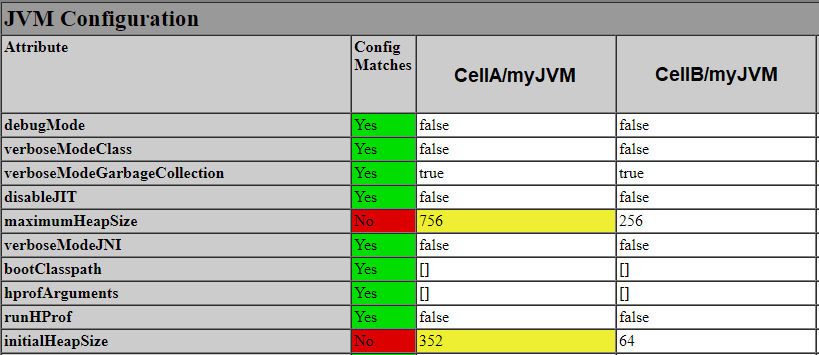
IBMs Configuration Comparison Tool (CCT) is a tool that will create HTML files comparing the configurations of IBM application server components in two different cells, such as comparing the configurations of a JVM, application, or resource in cell "a" to the configurations of a JVM, application, or resource in cell "b".
For example, the HTML file comparing JVMs will identify if the JVM configurations (such as min:max heap) in cell “a” are identical or different to the JVM configurations in cell “b”. In this example, the configurations are different.

IBMs Configuration Comparison Tool (CCT) is actually nothing more than a collection of 5 Python scripts and 2 configuration files. The Python scripts and configuration files are downloaded from this URL. The Python scripts and configuration file are stored in a gzip compressed tar archive, thus when you download the tool, you download a file named cct-yyyymmdd.tar.gz.
It usually makes sense to place the gzip compressed tar archive on a server in your organzation that contains scripts since you will more than likely end up creating a wrapper script to run the Configuration Comparison Tool. Once you've placed the gzip compressed tar archive on a server, unzip and extract the archive.
gunzip cct-yyyymmdd.tar.gz
tar -xf cct-yyyymmdd.tar /path/to/directory
The directory that contains the extracted archive should now contain the following files.
- WAS_Configuration_Comparison_Tool.ppt
- ConfigDump.py
- ConfigReportAttributes.properties
- ConfigReport.properties
- ConfigReport.py
- ConfigUtils.py
- WAuJ.py
- WAuJ_utilities.py
Next you will want to create one or more dump .cfg configuration files.
IMPORTANT – If IBM releases a new version of the Configuration Comparison Tool (CCT), you should test the new version of the tool before replacing the current scripts and configuration files being used. The reason for this is because of the following bugs with the current version of the tool. If these bugs have not been fixed by a new version of the Configuration Comparison Tool (CCT), you will need to re-address the bugs with the new version of the tool.
Did you find this article helpful?
If so, consider buying me a coffee over at 